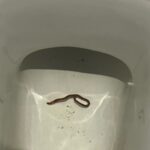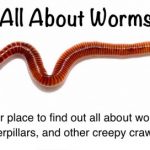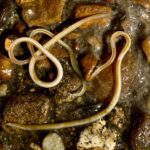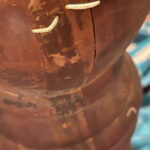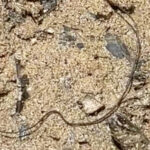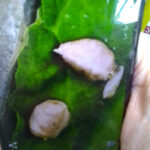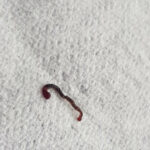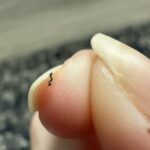Roundworms live in nearly all vertebrate animals, and many invertebrates. However, the parasitic species that cause disease are the most significant to man. The intestinal parasite Ascaris lumbricoides can cause pain and diarrhea, while the filarial worm Wuchereria bancrofti causes a disfiguring condition called elephantiasis.
Roundworms are spindle-shaped and they have thin, inflexible body walls that restrict their movements to whiplike thrashing. The roundworms nervous system is built on a H-shaped arrangement of canals that open via a pore at the front of the body. These animals have sensory structures that respond to light, chemicals, and touch stimuli.
Unlike other types of worms and roundworms that have both male and female sex organs (hermaphroditic), in Ascaris lumbricoides the sexes are separate. The males are smaller than the females and they have only one testis. Females have two ovaries. Fertilization takes place during copulation when the male injects sperm into the female. The female can lay up to 200,000 eggs in one day, which are eliminated in the feces of the host. The eggs can develop through several stages and in multiple hosts, such as dogs.
Roundworm infections in dogs are actually quite common, so there is no need to panic if you discover the infection early. Unfortunately, if left untreated, roundworms can cause major problems within your dogs intestines and digestive system. Roundworms feed on fecal matter, dead organisms, and living tissues. Feeding can take place outside of or within the pet’s body. Roundworms are easy to contract from dog runs, parks, carcasses, and even from casual contact with other animals. Roundworms can be found around pets’ paws (from scratching around the anus).
One of the easiest ways to detect roundworm is to examine your dog’s feces. You should be able to see any dog worms or segments in plain sight. It is also important to be able to distinguish what the different types of worms look like. Roundworms look like spaghetti and tapeworm segments look like grains of rice.
In addition to dog runs, parks, other pets, and dead animals, fleas are a major source of roundworms. When a dog accidentally swallows an infected flea, worms can hatch in the dog’s intestines. Round worm eggs can remain infectious for years, so keeping your yard clean and keeping your pet away from dirty dog runs and dead rodents is crucial to keeping him worm-free.
If you notice any changes in your dog’s behavior, weight or eating habits, he may have round worm. Symptoms of round worm include:
·Change in your dog’s appetite
·Diarrhea
·Distended abdomen in puppies
·Dull coat
·Inability to exercise
·Vomiting
·Weakness
·Weight loss
There are ways to prevent round worms. One of the most important ways to prevent a serious worm infection is to have your pet screened for worms twice per year. If your dog is considered high-risk for worms, you should have him screened more than twice a year. High-risk dogs live in condensed urban areas and they usually live in a home with more than one pet. Show pets and hunting dogs are also considered high-risk.
Caring for a dog with roundworms should be done only under the care of a vet. Most non-prescription medications don’t work. Your vet will have access to a number of cutting-edge preventatives that are extremely effective against the most aggressive types of parasites such as roundworm, whipworm, hookworm, and heartworm.
In addition to preventative measures, it’s also a good idea to keep your dog clean and well groomed. You should also dispose of dog feces immediately. Never leave it in piles around your yard, dog run, etc. If you notice any of the symptoms of canine worms listed above, please contact your vet immediately.
Interested in alternative cures for dog worms? Speak with your vet about alternative cures or contact the American Holistic Veterinary Medical Association to locate a holistic vet in your area.
American Holistic Veterinary Medical Association
2218 Old Emmorton Road
Bel Air, MD 21015
phone 410-569-0795
fax 410-569-2346
e-mail: of****@ah***.org
website: http://www.ahvma.org
All About Worms is always free, always reader-supported. Your tips via CashApp, Venmo, or Paypal are appreciated! Receipts will come from ISIPP Publishing.



